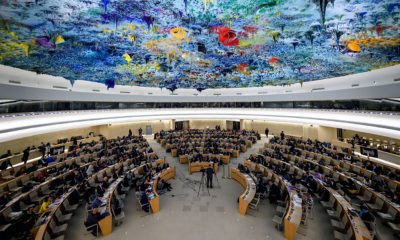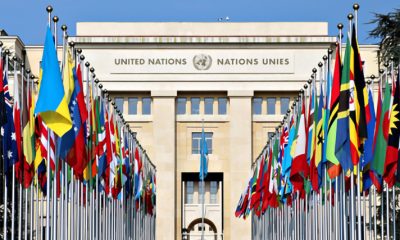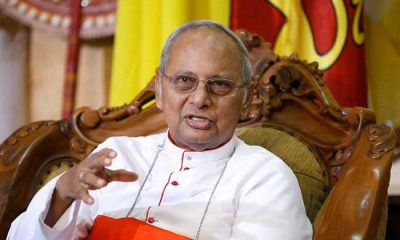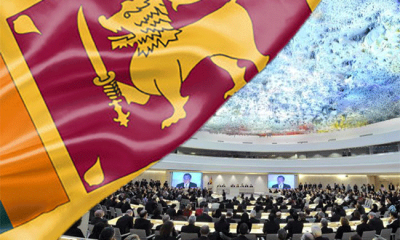News
Amnesty Intl urges UNHRC to strengthen its oversight of Lanka
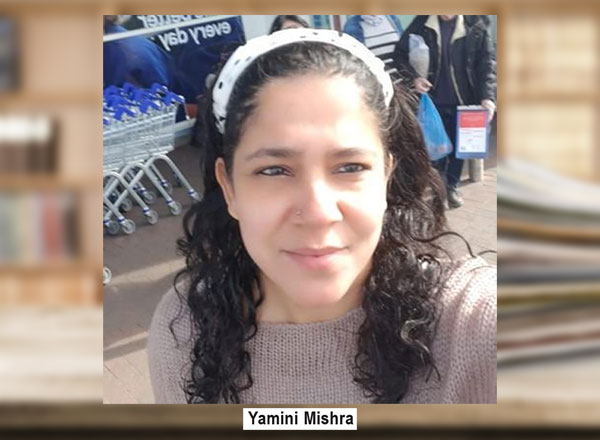
Amnesty International has urged the United Nations Human Rights Council (UNHRC), when it meets for the 51st session between September 12 and October 07, to strengthen the existing Sri Lanka accountability project of the Office of the UN High Commissioner for Human Rights (OHCHR), that was established to collect, consolidate, analyse and preserve information and evidence for future.
In a briefing paper, the rights organization also called on the UNHRC to set up an expert mechanism on Sri Lanka to monitor, report, provide recommendations on human rights concerns that are at the core of the current crisis.
The Sri Lankan authorities have fiercely clamped down on protests and demonized protesters during a period of economic crisis and hardship in the country, Amnesty International said in a new digest released today.
The briefing, Penalized for Protesting: Sri Lanka’s crackdown on protestors, details how the authorities have failed to protect peaceful protesters and resorted to excessive use of force, deploying the military to police protests and carrying out reprisals against protestors while also demonizing those who exercise their protest rights peacefully.
“Over the last few months, Sri Lanka has seen widespread protests over the worst economic crisis in the country’s post-independence history. People have the right to express discontent peacefully and the state has an obligation to facilitate this right but the Sri Lankan authorities have repeatedly and unrelentingly stifled the voice of the people,” said Yamini Mishra, Amnesty International’s South Asia Regional Director.
“The new government in Sri Lanka has continued resorting to the unlawful use of force, intimidation and harassment to subdue protestors, sending a chilling message to the people of Sri Lanka that there is no room for dissent. The right to freedom of peaceful assembly is a keystone of any rights respecting society. It must be respected and protected.”
It must be noted that there have been some incidents of violence during protests since the protest movement began in February 2022. While these protests cannot be deemed as peaceful, the response by the authorities to such protest must still comply with human rights laws and standards.
Since the protests began five months ago, the police and armed forces have routinely misused tear gas and water cannons against largely peaceful protesters. On two occasions, security forces fired live ammunition at protesters, killing at least one person in Rambukkana on 19 April.
This unlawful use of force was also witnessed in other key incidents demonstrating the government’s refusal to facilitate the right to peaceful assembly, despite their obligations under international human rights laws and standards.
Since President Ranil Wickremesinghe came into power on 21 July, over 140 protesters have been arrested, while a further 18 have been issued travel bans. Furthermore, Members of Parliament and the President have repeatedly described protesters as “terrorists”. President Wickremesinghe, meanwhile, also labelled protesters as “fascists” amid a broader pattern of demonizing the protest movement. The authorities have taken this one step further by weaponizing the draconian anti-terror law Prevention of Terrorism Act (PTA) to arrest three protesters. Amnesty International has, in the past, documented the use of the draconian PTA by the authorities to target, and harass minorities, activists, journalists and critical voices. The PTA is in violation of international human rights law and must be repealed.
Since 2 April, the authorities have arrested some people in a manner that flouts due process. Security forces did not produce official identification or produce arrest warrants or adequately explain the reason for arrests. Certain individuals were taken away and held for several hours at undisclosed locations. On these occasions, no confirmation of arrest was issued, nor were detainees given the opportunity to inform their relatives, friends or lawyers of their whereabouts.
One of the protestors told Amnesty International: “I’m still worried that they are trying to arrest me and accuse me of things I have not committed, because they want me in jail.”
These arrests, which constituted unlawful deprivation of liberty, should immediately be stopped and the authorities must carry out arrests in keeping with their obligations under the international law and standards, including the ICCPR which prohibits arbitrary detention and protects the right to liberty and security of person. The authorities must also end their use of Emergency Regulations, which give sweeping powers to the police and the armed forces to search and make arrests without due process safeguards and have been shown to flout international human rights law.
Another protestor, who suffered repeated harassment at the hands of the authorities, told Amnesty International: “Many of us got travel bans, and surveillance and tear gas attacks and baton charged and, at times, court orders and imprisonment… The state is always protecting and only defending political power and does not stand on the side of the people.”
Amnesty International calls on the Sri Lankan authorities to drop all charges against those protesters who were participating peacefully in so called “unlawful assemblies”. All those facing such charges must be immediately released. The authorities must also hold prompt, transparent and impartial investigations into all allegations of attacks on peaceful protesters, with support from international observers.
“The relentless repression of the right to freedom of peaceful assembly, movement and expression speaks to Sri Lanka’s legacy of suppressing dissent. Given the immense and historic support for the peaceful protest movement, the Sri Lankan authorities should change course and immediately end their suppression of people’s right to protest,” said Yamini Mishra.
News
US sports envoys to Lanka to champion youth development

The U.S. Embassy in Colombo welcomed the U.S. Sports Envoys to Sri Lanka, former National Basketball Association (NBA) and Women’s National Basketball Association (WNBA) players Stephen Howard and Astou Ndiaye, from June 8 through 14.
The Public Diplomacy section of the U.S. Embassy said that it would launch a weeklong basketball program intended to harness the unifying power of sports, made possible through collaboration with Foundation of Goodness and IImpact Hoop Lab.
While in Sri Lanka, Howard and Ndiaye, both retired professional basketball players, will conduct a weeklong program, Hoops for Hope: Bridging Borders through Basketball. The Sports Envoys will lead basketball clinics and exhibition matches and engage in leadership sessions in Colombo and Southern Province for youth aged 14-18 from Northern, Uva, Eastern and Western Provinces, offering skills and leadership training both on and off the court. The U.S. Envoys will also share their expertise with the Sri Lanka Basketball Federation, national coaches, and players, furthering the development of basketball in the country. Beyond the clinics, they will collaborate with Sri Lankan schoolchildren to take part in a community service project in the Colombo area.
“We are so proud to welcome Stephen and Astou as our Sports Envoys to Sri Lanka, to build on the strong people-to-people connections between the United States and Sri Lanka,” said U.S. Ambassador Julie Chung. “The lessons that will be shared by our Sports Envoys – communication, teamwork, resilience, inclusion, and conflict resolution – are essential for leadership development, community building, equality, and peace. The U.S. Sports Envoy program is a testament to our belief that sports can be a powerful tool in promoting peace and unity.”
News
Rahuman questions sudden cancellation of leave of CEB employees

SJB Colombo District MP Mujibur Rahuman in parliament demanded to know from the government the reasons for CEB suspending the leave of all its employees until further notice from Thursday.
MP Rahuman said that the CEB has got an acting General Manager anew and the latter yesterday morning issued a circular suspending leave of all CEB employees with immediate effect until further notice.
“We demand that Minister Kanchana Wijesekera should explain this to the House. This circular was issued while this debate on the new Electricity Amendment Bill was pending. There are many who oppose this Bill. The Minister must tell parliament the reason for the urge to cancel the leave of CEB employees,” the MP said.However, Speaker Mahinda Yapa Abeywardena prevented Minister Wijesekera responding to the query and said that the matter raised by MP Rahuman was not relevant.
News
CIPM successfully concludes 8th Annual Symposium

The Chartered Institute of Personnel Management (CIPM) successfully concluded the 8th Annual CIPM Symposium, which took place on 31st May 2024. Themed “Nurturing the Human Element—Redefining HRM in a Rapidly Changing World,” the symposium underscored the pivotal role of human resource management (HRM) in today’s dynamic global landscape. Since its inception in 1959, CIPM has been dedicated to advancing the HR profession through education, professional development, and advocacy, solidifying its position as Sri Lanka’s leading professional body for HRM.
Ken Vijayakumar, the President of the CIPM, graced the occasion as the chief guest. The symposium commenced with the welcome address by the Chairperson, Prof. Arosha Adikaram, followed by the Web Launch of the Symposium Proceedings and Abstract Book by the CIPM President. The event featured distinguished addresses, including a speech by Chief Guest Ken Vijayakumar, President of CIPM, and an address by Guest of Honor Shakthi Ranatunga, Chief Operating Officer of MAS Holdings Pvt. Ltd., Sri Lanka.
The symposium also featured an inspiring keynote address by Prof. Mario Fernando, Professor of Management and Director of the Centre for Cross Cultural Management (CCCM) at the University of Wollongong, Australia.
Vote of Thanks of the inauguration session was delivered by Dr. Dillanjani Weeratunga, Symposium Co-chair.
The symposium served as a comprehensive platform for researchers to present their findings across a wide range of critical topics in HRM. These included Cultural Diversity and Inclusion, Talent Development and Retention, Ethical Leadership and Corporate Social Responsibility, Adapting to Technological Advancements, Mental Health and Well-being at Work, Global Workforce Challenges, Employee Empowerment, and Reskilling and Upskilling.
The plenary session was led by Prof. Wasantha Rajapakse. Certificates were awarded to the best paper presenters during the valedictory session, followed by a vote of thanks delivered by Kamani Perera, Manager of Research and Development.
The annual symposium of CIPM was a truly inclusive event, attracting a diverse audience that spanned undergraduates, graduates, working professionals, research scholars and lecturers. This widespread interest highlights the symposium’s significance in the field of HRM, offering a unique opportunity for everyone to network and learn from scholarly brains.The CIPM International Research Symposium was sponsored by Hambantota International Port, Sri Lanka Institute of Information Technology (SLIIT), E B Creasy & Co. PLC, and Print Xcel Company.


